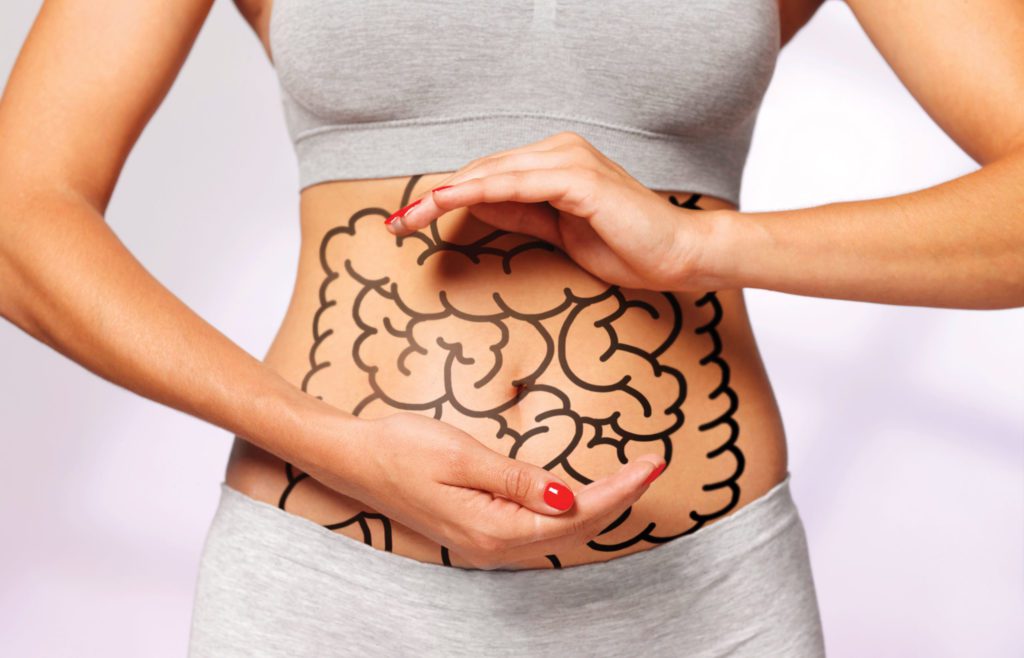

Rebecca Boothe

Micki Irvine-Creaser

Rebecca Boothe

Micki Irvine-Creaser
IBS: Ultimate guide to treating IBS naturally - a Naturopathic perspective
If you’re looking to treat IBS naturally then look no further. This is the complete guide to getting to the bottom of your gut issues and treating IBS naturally. We will cover every aspect of IBS including:
- Signs and Symptoms of IBS
- Causes and Contributors of IBS
- Pathophysiology/aetiology of IBS
- Natural Treatments for IBS
- Herbal Treatments for IBS
- Nutritional Treatments for IBS
- Lifestyle Treatments for IBS
- Differential Diagnoses of IBS
- Diagnostic Criteria of IBS
What is IBS?
IBS or Irritable Bowel Syndrome is a functional bowel disorder that affects the large intestine (colon). It is characterised by abdominal cramping, pain, and altered bowel motions, which can range from constipation to diarrhoea or a mixture of both. IBS is a chronic condition that can significantly affect a person’s quality of life, although it does not cause any long-term damage to the digestive system or increase the risk of more serious health conditions.
There are three main subtypes of IBS, each with its own unique symptoms and diagnostic criteria:
1. IBS with constipation (IBS-C)
IBS-C is characterised by infrequent bowel movements, hard or lumpy stools, and difficulty passing stools. Individuals with IBS-C may also experience bloating and abdominal discomfort, which can be relieved after a bowel movement.
2. IBS with diarrhoea (IBS-D)
IBS-D is characterised by frequent, loose or watery stools, urgency to have a bowel movement, and a feeling of incomplete evacuation after a bowel movement. Individuals with IBS-D may also experience abdominal cramping and bloating.
3. IBS with mixed constipation and diarrhoea (IBS-M)
IBS-M is characterised by a combination of symptoms from IBS-C and IBS-D. Individuals with IBS-M may experience alternating bouts of constipation and diarrhoea, as well as abdominal pain and bloating.
It is important to note that the symptoms of IBS can vary widely from person to person and may change over time. Some individuals may experience mild symptoms that do not significantly impact their daily life, while others may experience more severe symptoms that require ongoing management and treatment.
Signs and Symptoms of IBS
The signs and symptoms of IBS can vary widely from person to person, and may also change over time. Some individuals with IBS may experience mild symptoms that do not significantly impact their daily life, while others may experience more severe symptoms that require ongoing management and treatment. Some of the most common signs and symptoms of IBS include:
- Abdominal pain and cramping: This is one of the most common symptoms of IBS, and may be felt anywhere in the abdomen. The pain may be sharp, dull, or crampy in nature, and may come and go in intensity.
- Bloating: Many individuals with IBS experience bloating, which can make the abdomen feel swollen or distended. Bloating may be worsened by certain foods, stress, or hormonal changes.
- Flatulence: Gas is a normal byproduct of digestion, but individuals with IBS may experience increased gas production and flatulence. This may be accompanied by abdominal discomfort or bloating.
- Diarrhoea/Constipation: IBS can cause changes in bowel movements, ranging from frequent loose stools to infrequent hard stools. Some individuals with IBS may experience alternating bouts of constipation and diarrhea.
- Mucous in stool: Some individuals with IBS may notice the presence of mucous in their stool. This is usually not a cause for concern, but it is important to bring it to the attention of a healthcare provider.
- Dyspepsia (indigestion): IBS can also cause indigestion, which may present as a feeling of fullness or discomfort in the upper abdomen. Indigestion may be accompanied by bloating, nausea, or heartburn.
Causes and Contributors of IBS
The exact cause of IBS is not fully understood, and there may be a number of factors that contribute to its development. Some of the most commonly recognised causes and contributors of IBS include:
1. Infection:
In some cases, IBS may be triggered by a bacterial, viral, or parasitic infection that disrupts the normal function of the gut. This can lead to symptoms such as abdominal pain, bloating, and changes in bowel movements.
2. Small intestinal bacterial overgrowth (SIBO)/Large intestinal bacterial overgrowth (LIBO):
SIBO and LIBO occur when there is an overgrowth of bacteria in the small or large intestine, respectively. This can lead to symptoms similar to those of IBS, including abdominal pain, bloating, and changes in bowel movements.
3. Food allergies/intolerances/sensitivities:
Certain foods may trigger IBS symptoms in some individuals, particularly those with underlying food allergies, intolerances, or sensitivities. A recent study found that testing for IgG antibodies and removing reactive foods resulted in a 26% improvement in IBS symptoms. Common reactive foods may include:
- Wheat and gluten: Coeliac disease (often misdiagnosed as IBS) and non-coeliac gluten sensitivity (caused by microbial alterations) may trigger IBS symptoms in some individuals.
- Dairy: Lactose and/or protein in dairy products may trigger IBS symptoms in some individuals.
- Coffee: The caffeine and acid content in coffee may irritate the gut and exacerbate IBS symptoms.
- Egg, corn, onion, potato, yeast, citrus, fructose, sorbitol: These foods have been shown to trigger IBS symptoms in some individuals.
4. Microflora alterations:
The gut microbiome plays an important role in gut health, and alterations in the microbiome may contribute to the development of IBS. For example, an overgrowth of harmful bacteria or a reduction in beneficial bacteria may lead to gut dysfunction and IBS symptoms.
5. Stress:
Stress is a common trigger for IBS symptoms, as it can disrupt the normal function of the gut and exacerbate symptoms such as abdominal pain and changes in bowel movements.
Book an Appointment with our Specialised IBS Naturopath
Online and phone appointments available Australia wide

Pathophysiology/Aetiology of IBS:
The exact cause of IBS remains unknown, but it is considered to be multifactorial, with several theories explaining its pathophysiology. The following are essential to target if you’re looking to treat IBS naturally.
Dysregulation of the Gut-brain Axis
One theory is the dysregulation of the gut-brain axis, which controls the communication between the gut and the brain. The parasympathetic nervous system stimulates appropriate digestion and relaxes sphincter muscles in the digestive tract, while the sympathetic nervous system does the opposite. IBS patients are often seen to have sympathetic dominance, and stress increases this dominance.
Altered Serotonin Signalling
Another theory is altered serotonin signalling, as approximately 95% of serotonin is located in the gastrointestinal (GI) tract. Serotonin stimulates peristalsis and secretion. Excess serotonin in the gut causes diarrhea, and too little causes constipation. This may be due to the number of enterochromaffin cells, serotonin levels, tryptophan hydroxylase message levels, and the expression of serotonin-selective re-uptake transporter.
Infection
Infection, particularly gastroenteritis, is another possible cause of IBS. Rates of post-infectious IBS are estimated to be between 4% to 31% of IBS patients. Microflora alterations are also implicated in the pathophysiology of IBS. Antibiotics, anti-inflammatories, oral contraceptive pills, and other medications can cause alterations in the gut microflora. Approximately 50% of IBS patients have small intestinal bacterial overgrowth (SIBO). Proton-pump inhibitors (PPIs), histamine-2 (H2) antagonists, gastrointestinal surgery, immune deficiency, and malnutrition can also cause or contribute to microflora alterations. More than 80% of IBS patients showed improvement after treatment with rifaximin, and probiotics, further showing the microbiome plays a large role in the development of IBS.
Food hypersensitivity
Food hypersensitivity is also a contributor to IBS. A study shows that removing foods that cause IgG antibodies results in a 26% improvement in IBS patients. The most common food allergens/intolerances/sensitivities in IBS patients include wheat and gluten, dairy, lactose and/or protein, coffee, egg, corn, onion, potato, yeast, citrus, fructose, and sorbitol. Coeliac disease and non-coeliac gluten sensitivity are often misdiagnosed as IBS.
Treating IBS Naturally
Please note the following are treatments mentioned for treating IBS naturally are for the management and symptoms of IBS not the underlying causes such as SIBO, parasitic infection, and food allergies or sensitivities. To get on top of your symptoms and not need symptomatic management, please treat the underlying cause for best results.
Herbal Treatment for IBS
Herbal treatment for IBS can provide relief from the symptoms of this condition. Some of the best herbal treatment for IBS include turmeric, globe artichoke, peppermint, and chamomile.
Turmeric for IBS
Turmeric has anti-inflammatory and antioxidant properties that can reduce inflammation in the digestive tract and improve digestion. It can also help to regulate bowel movements and reduce bloating and abdominal pain.
Globe artichoke for IBS
Globe artichoke is another herb that can be helpful for IBS. It can stimulate the production of bile and improve the digestion of fats, which can help to reduce symptoms such as bloating and abdominal discomfort.
Peppermint for IBS
Peppermint is a well-known herb that can provide relief from IBS symptoms such as bloating, gas, and abdominal pain. It has antispasmodic properties that can help to relax the muscles in the digestive tract, reducing cramping and discomfort.
Chamomile for IBS
Chamomile is a soothing herb that can help to calm the nerves and reduce stress and anxiety. It can also help to relax the muscles in the digestive tract, which can help to reduce cramping and discomfort. Chamomile tea is a popular way to enjoy the benefits of this herb.
It’s important to note that herbal treatments should be used under the guidance of a qualified healthcare practitioner. While herbs can be effective for treating IBS naturally, they can also interact with medications and cause side effects in some people. A naturopathic doctor or herbalist can help to determine the best herbal treatments for your individual needs.
Nutritional Treatment for IBS
Probiotics
Nutritional interventions can play a crucial role in managing the symptoms of IBS. Probiotics are beneficial bacteria that help maintain a healthy gut microbiome and are some of the best nutritional treatments for IBS. The strain Lactobacillus rhamnosus has been studied extensively for its effectiveness in managing IBS symptoms. In a study, patients who received L. rhamnosus supplementation showed a significant improvement of 42% in IBS symptoms compared to the placebo group.
Other probiotic strains that have been shown to be effective in managing IBS symptoms include Lactobacillus casei, Lactobacillus plantarum, Lactobacillus acidophilus, Lactobacillus delbrueckii subsp. bulgaricus, Bifidobacterium longum, Bifidobacterium breve, Bifidobacterium infantis, and Streptococcus salivarius subsp. thermophilus.
Fibre
Fibre is another important nutrient in managing IBS symptoms, particularly for those with constipation. Psyllium, a form of soluble fibre, has been shown to effectively relieve constipation in IBS patients. It works by softening the stool and increasing its bulk, thereby facilitating its passage through the digestive tract.
It is important to ensure adequate water intake when taking psyllium or increasing fibre intake, as insufficient hydration can exacerbate constipation. Additionally, increasing fibre intake gradually and including a variety of fibre sources in the diet can help prevent bloating and other digestive symptoms.
Dietary Treatment for IBS
Dietary modifications can play a significant role in managing IBS symptoms. Avoiding known food triggers and following a low FODMAP diet have been shown to be effective dietary treatments for IBS and helpful in reducing symptoms.
Consuming water is essential for maintaining healthy bowel movements. IBS patients often experience dehydration due to diarrhoea, and drinking enough water can help alleviate constipation. It is recommended to consume at least 2.5 liters of water per day.
Fish is easily digestible and an excellent source of essential fatty acids. Herbal teas such as chamomile and peppermint have also shown to have a calming effect on the digestive system.
On the other hand, it is essential to avoid certain foods that can trigger IBS symptoms, including high FODMAP foods and drinks such as wheat and gluten, dairy, lactose and/or protein, coffee, alcohol, egg, corn, onion, potato, yeast, citrus, and foods high in fructose and sorbitol. It is also recommended to avoid diet soft drinks and other “diet” products.
Lifestyle Treatments for IBS
Lifestyle treatments for IBS are essential in managing the condition. Making certain changes to your lifestyle can significantly reduce symptoms and improve your quality of life. Here are some of the best lifestyle treatments for IBS:
Exercise
Physical activity has been shown to reduce IBS symptoms. Exercise improves bowel motility, reduces inflammation and stress, and helps to maintain a healthy body weight. It is recommended to engage in regular exercise for at least 30 minutes a day, 3-5 times per week.
Meditation
Stress is a significant contributor to IBS. Practicing relaxation techniques, such as meditation, can help to reduce stress levels and improve symptoms. Meditation involves deep breathing and mental focus, which can help to calm the mind and reduce stress.
Stress management techniques
Stress management techniques, such as yoga, tai chi, and mindfulness, can help to reduce stress levels and improve symptoms. Finding activities that you enjoy and that help you to relax is crucial for managing IBS symptoms.
Ensure Adequate Sleep
Sleep is essential for maintaining overall health, including gut health. Getting enough sleep each night can help to reduce stress levels and improve symptoms. It is recommended to aim for 7-9 hours of sleep per night.
Incorporating these lifestyle treatments into your daily routine can help to manage IBS symptoms and improve your overall health and wellbeing.
Differential Diagnoses of IBS
It is important to differentiate IBS from other conditions that can present with similar symptoms. Some conditions that need to be ruled out are:
Structural deformity
A structural deformity of the digestive tract, such as a hernia or a tumor, can cause similar symptoms to IBS. Imaging studies such as an X-ray or CT scan may be used to detect these conditions.
Infection
Infections caused by bacteria, viruses, or parasites can cause symptoms similar to IBS. Testing of stool samples can help diagnose infections.
Coeliac disease
Coeliac disease is an autoimmune disorder where the body reacts to gluten, a protein found in wheat, barley, and rye. Coeliac disease can cause similar symptoms to IBS. Blood tests and a small bowel biopsy can help diagnose coeliac disease.
SIBO
Small intestinal bacterial overgrowth (SIBO) is a condition where there is an abnormal increase in the number of bacteria in the small intestine. SIBO can cause similar symptoms to IBS. A breath test can help diagnose SIBO.
Dysbiosis
Dysbiosis is an imbalance of the normal bacteria in the gut, which can cause similar symptoms to IBS. Testing of stool samples can help diagnose dysbiosis.
Inflammatory bowel disease (IBD)
IBD is a group of inflammatory conditions of the colon and small intestine. IBD can cause symptoms similar to IBS, but is typically associated with diarrhoea that is often bloody, and weight loss. A colonoscopy can help diagnose IBD.
Diverticulitis
Diverticulitis is a condition where small, bulging pouches in the digestive tract become inflamed or infected. Diverticulitis can cause similar symptoms to IBS. A CT scan can help diagnose diverticulitis.
It is important to rule these in or out as you may have been given the wrong diagnosis of IBS
Diagnostic Criteria of IBS
The ROME IV criteria are the widely accepted criteria for the diagnosis of IBS. To meet these criteria, an individual must experience recurrent abdominal pain, on average of at least 1 day per week in the last 3 months. Additionally, the pain must be associated with two or more of the following: related to defecation, associated with a change in stool frequency, or associated with a change in stool form (appearance).
It is important to note that the criteria should be fulfilled for the last 3 months with symptom onset over 6 months prior to diagnosis. In order to make an IBS diagnosis, a healthcare provider must also rule out any structural or biochemical explanations for the symptoms, such as inflammatory bowel disease, coeliac disease, or colon cancer. This often involves a thorough medical history, physical examination, and possibly diagnostic tests like blood tests, stool tests, or imaging studies.
Testing/Examinations for IBS
There are several tests and examinations that may be used to diagnose IBS and rule out other potential disorders. These include:
SIBO breath test
a breath test can be used to identify small intestinal bacterial overgrowth (SIBO), which may be contributing to IBS symptoms. The test involves drinking a sugar solution and measuring the gases in the breath over a period of time.
Microbiome Mapping
a stool test can be used to analyse the composition of the gut microbiome, which may be altered in individuals with IBS.
IgG Radioallergosorbent test (RAST)
This blood test measures IgG4 reactions to 90+ foods and can be useful in identifying potential food triggers that may be contributing to IBS symptoms.
Colonoscopy
a colonoscopy may be recommended to rule out other disorders that may be causing IBS-like symptoms, such as inflammatory bowel disease (IBD) or diverticulitis.
Endoscopy
This may also be used to investigate the gut lining and rule out any structural abnormalities or inflammation.
Lactulose/Mannitol Test
This test is useful for identifying intestinal permeability, which may be a factor in IBS symptoms.
References
- Lacy, B. E., Mearin, F., Chang, L., Chey, W. D., Lembo, A. J., Simren, M., & Spiller, R. (2016). Bowel disorders. Gastroenterology, 150(6), 1393-1407. https://pubmed.ncbi.nlm.nih.gov/27144627/
- Ford, A. C., Lacy, B. E., & Talley, N. J. (2017). Irritable bowel syndrome. New England Journal of Medicine, 376(26), 2566-2578. https://www.ncbi.nlm.nih.gov/pmc/articles/PMC4194613/
- Lacy BE, Patel NK. Rome Criteria and a Diagnostic Approach to Irritable Bowel Syndrome. J Clin Med. 2017 Oct 26;6(11):99. https://www.ncbi.nlm.nih.gov/pmc/articles/PMC5704116/
- Chedid, V., Dhalla, S., Clarke, J. O., Roland, B. C., Dunbar, K. B., Koh, J., … & Mullin, G. E. (2014). Herbal therapy is equivalent to rifaximin for the treatment of small intestinal bacterial overgrowth. Global Advances in Health and Medicine, 3(3), 16-24.https://www.ncbi.nlm.nih.gov/pmc/articles/PMC3002524/
- Staudacher, H. M., Irving, P. M., Lomer, M. C., Whelan, K. (2014). Mechanisms and efficacy of dietary FODMAP restriction in IBS. Nature Reviews Gastroenterology and Hepatology, 11(4), 256-266. https://www.ncbi.nlm.nih.gov/pmc/articles/PMC6174353/
- Altobelli, E., Del Negro, V., Angeletti, P. M., & Latella, G. (2017). Low-FODMAP diet improves irritable bowel syndrome symptoms: a meta-analysis. Nutrients, 9(9), 940. https://www.ncbi.nlm.nih.gov/pmc/articles/PMC5451283
Book an Appointment
Lets get on top of your health issues once and for all!

Location
2/773 Marion Rd, Ascot Park 5043 SA, Australia
Call
0422 544 312
Email Us
admin@adelaidenaturopathic.com.au
